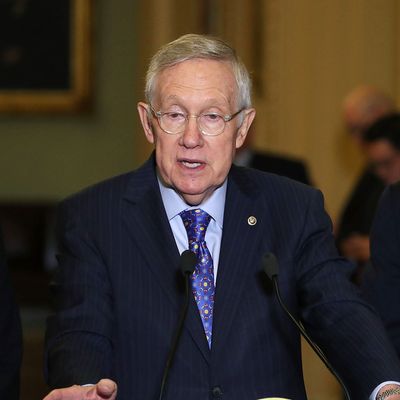
In this moment of maximum garment-rending and soul-struggling for Democrats, there is one very calm figure: Senate Democratic Leader Harry Reid. In an interview with Politico, he makes it clear he doesn’t think Democrats need to change a whole lot of things to recover from what happened on November 8:
To hear Reid tell it, the party’s electoral collapse wasn’t a result of poor messaging or even a bad candidate. It stemmed from looser campaign finance rules, FBI Director James Comey and the influence of a few powerful individuals — namely the Koch brothers, his long-running nemeses. The outgoing Senate minority leader is unapologetic on behalf of his party, and remains resolute that Democrats don’t need to chart a new political course after their 2016 debacle.
“They have Trump, I understand that. But I don’t think the Democratic Party is in that big of trouble,” Reid said in a half-hour interview with Politico on Wednesday, one day before he’ll deliver his farewell address. “I mean, if Comey kept his mouth shut, we would have picked up a couple more Senate seats and we probably would have elected Hillary.”
Now to be clear, Reid’s on the very brink of retirement, and is thinking about his party from the long perspective of 34 years in Congress. Perhaps more to the point, he has nothing to apologize for in terms of Democratic performance this year in his own state, where he was very much the big dog. Democrats carried the state in the presidential race, hung onto Reid’s own Senate seat, won two of the six net seats Democrats picked up in the U.S. House, and for dessert, won back control of both chambers of the state legislature. He has every right to be “complacent” about Nevada.
Whether or not Reid is right about Comey, it is true the White House and Senate losses were very narrow. A shift of a little over 80,000 votes in three states would have elected Clinton president, and her national popular-vote margin has swollen to 2.7 million. Democrats also lost very close Senate races in Pennsylvania, Missouri, and Wisconsin, and did gain two seats. The House was always the longest of long shots, and Democrats did gain those six seats. Thanks to our winner-take-all system, and the consequences of losing the ability to block the other party’s agenda by failing to win a congressional chamber, these defeats were potentially cataclysmic in consequences. But burning down everything that got them relatively close to their own trifecta does not necessarily make sense.
But the losses, of course, compounded others at the state level, as Jeff Stein points out in an acerbic commentary on Reid’s apparent “blasé” attitude. Republicans now control 68 state legislative chambers while Democrats just control 31. There are 33 Republican governors and just 16 Democrats. And that is what makes the current situation seem so desperate to many Democrats.
As I have been arguing ever since Election Day, however, there is very likely no immediate path to Democrats controlling a majority of the states any time soon, because there are basically 30 red states to 20 blue states. It would take a very different distribution of votes, or an unimaginable national landslide, to give Democrats majority control of state governments now, considering the steady recent decline of ticket-splitting. Those 30 red states give Republicans a huge built-in advantage in the Senate, and also contribute heavily (via state power over congressional redistricting) to GOP control of the House. The power of small states are also what made it possible for Republicans to lose the presidential popular vote decisively and still win the Electoral College. If you are going to blame anyone for this situation, it should probably be the Founders, who did not design a democracy.
Changing this landscape will take time, skill, and luck for Democrats. At the moment, the smartest thing for them to do is not to move to the left or to the right — to become “populists” or “centrists” — but instead to figure out how to become the most effective opposition party possible in Donald Trump’s Washington. The odds are very high that the GOP will either split or overreach in the very near future. For the first time since 2006 Democrats will be in a position to exploit Republican incumbency in the midterms in 2018. And there is no particular reason to assume Democrats will be in a worse position to win the presidential contest than they were this year, when they won by one measurement and lost by an eyelash in the other.
So maybe Harry Reid is right: Democrats should stay calm and avoid blowing themselves up. They are in no position to run the country right now. That has its advantages.






























